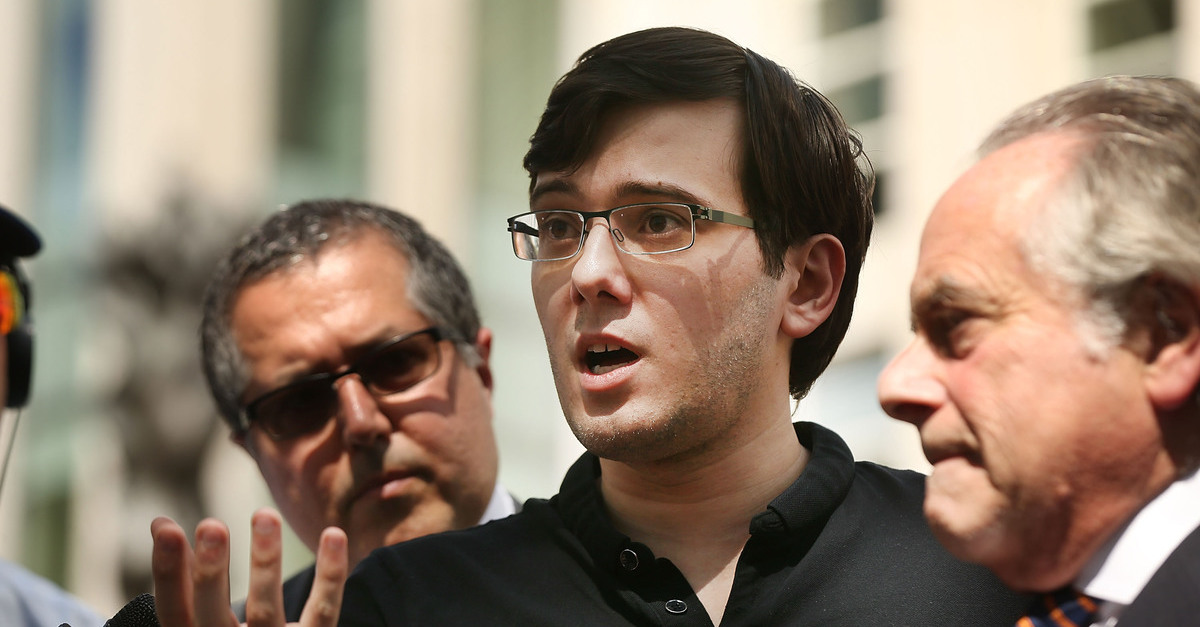
Ex-pharmaceutical executive Martin Shkreli speaks to the press in front of U.S. District Court for the Eastern District of New York with members of his legal team after the jury issued a verdict on Aug. 4, 2017.
Not even a seven-year sentence for securities fraud can keep Martin Shkreli from allegedly engaging in the machinations that earned him the nickname “Pharma Bro.”
In a ruling on Tuesday, a federal judge found that Shkreli used a contraband phone to communicate with his associates in the company behind Daraprim, the live-saving drug whose price he jacked up 40-fold roughly half a decade ago.
After the drug went from $13.50 per tablet to $500 overnight, Shkreli was criminally prosecuted for an unrelated “Ponzi-like scheme” involving investors in another drug company, Retrophin.
After a federal jury convicted him of securities fraud charges, state and federal regulators piled on civil antitrust charges revived from the old Daraprim scandal. Those accusations could lead to Shkreli’s lifetime ban from the pharmaceutical industry.
En route to trial, the Federal Trade Commission and multiple attorneys general asked U.S. District Judge Denise Cote to sanction Shkreli for destroying evidence. They asked the judge to effectively decide the case’s major issues in their favor before a trial, seeking judicial findings that Shkreli was “continuously involved in Vyera and Phoenixus’s business from 2015 to present,” “communicated with Vyera executives about company business from prison,” and “engaged in the challenged conduct” to restrain generic entry into the Daraprim market.
Refusing to go quite so far, Judge Cote made clear that she agreed with at least some of the regulators’ allegations about Shkreli’s handling of the evidence.
“The plaintiffs have shown that Shkreli has used a prison phone to discuss highly relevant company business and that he knew in doing so that those communications should have been but would not be preserved,” the 11-page ruling states. “Shkreli’s use of the prison phone to discuss business development constitutes intentional spoliation and warrants sanctions.”
The business communications at issue have to do with the company Vyera, the rebranded name of the company behind Shkreli’s price hike of Daraprim, Turing Pharmaceuticals. Phoenixus is the parent company of Vyera. Shkreli founded the company.
Vyera executive Akeel Mithani testified that he communicated with Shkreli about business development from the end of 2018 through February 2019, while Shkreli was incarcerated inside a low-security prison in Allenwood, Pennsylvania.
Some of those communications took place over the encrypted messaging platform WhatsApp, Mithani testified.
Kevin Mulleady, an owner and former director of Vyera, produced two text messages that he received from a still-incarcerated Shkreli in October 2017, some two months after the reputed Pharma Bro’s conviction.
When asked during a deposition earlier this year whether he had a cell phone in prison, Shkreli invoked his Fifth Amendment right against self-incrimination, according to the ruling.
“The plaintiffs have been prejudiced by Shkreli’s conduct because they do not have access to messages about Vyera that Shkreli sent and received while in prison,” Judge Cote found, opting for the lighter sanctions Shkreli proposed rather than what regulators requested.
“In an exercise of discretion, however, this Court declines to impose the plaintiffs’ proposed sanctions,” her ruling states. “As a result, Shkreli’s proposed sanction that he be precluded from introducing any argument or evidence contrary to the presumption that he communicated with Mr. Mulleady and Mr. Mithani about company business from prison is adopted.”
Cote declined to find that Vyera fell short in failing to preserve Shkreli’s messages by wiping his company-issued iPhone during a factory reset between 2016 and 2017, after regulators placed a preservation notice.
“Although it is undisputed that the Shkreli phone was subject to a factory reset in or around 2016-2017, Vyera has represented that it automatically backs up employee messages to iCloud,” Judge Cote found. “No party has suggested that that back up would not include text messages Shkreli sent and received using the Shkreli Phone. Counsel for Vyera will be required to confirm that an appropriate search has been conducted for these messages and that any relevant communications have been produced.”
Cote directed Vyera to file a letter stating whether it searched the company’s iCloud backup to or from the Shkreli phone.
Shkreli’s lawyer did not immediately respond to an email requesting comment.
Read the ruling below:
(Photo by Spencer Platt/Getty Images)
Have a tip we should know? [email protected]